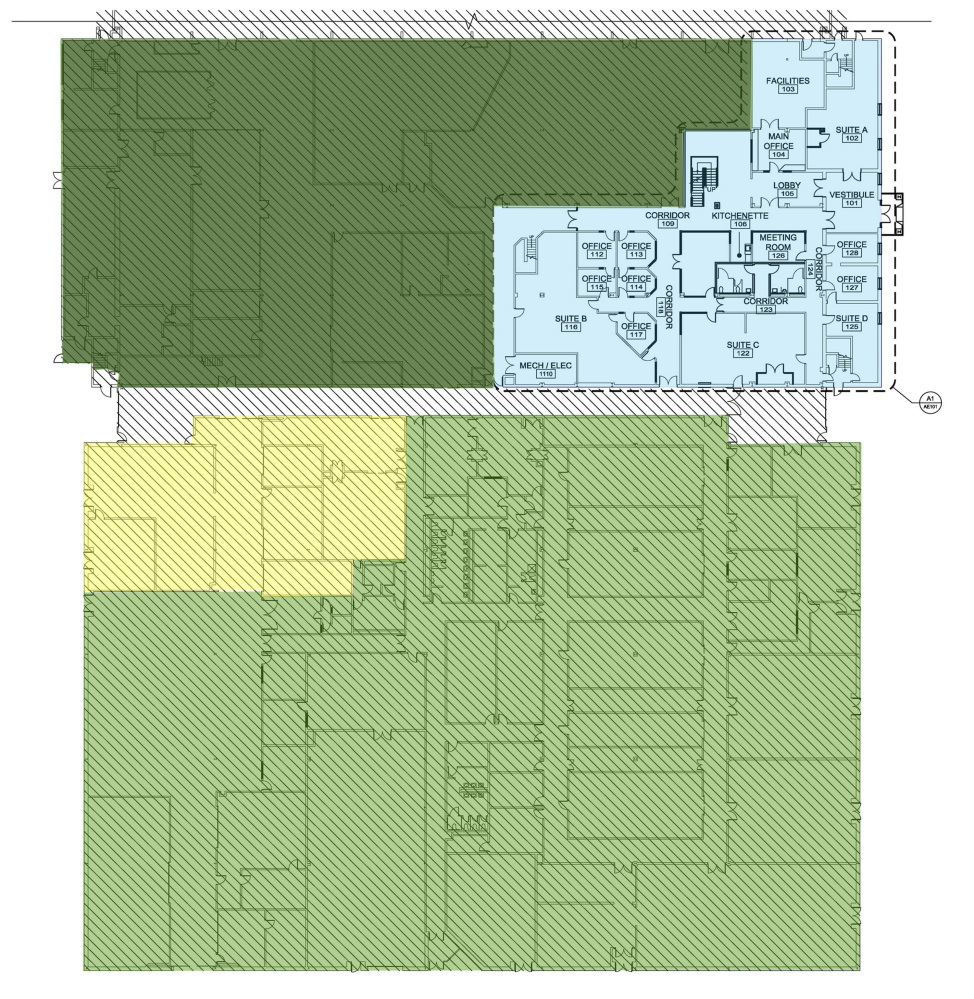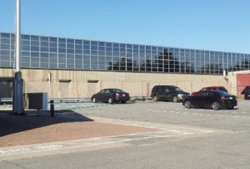Bruce Bickford’s small workshop in Cushing was just not big enough for STARC Systems, the manufacturing startup he began 18 months ago. Demand for the modular containment panels that he and his business partner, Tim Hebert, were developing for the health care industry had grown, and they needed more manufacturing space.
Instead of signing a year-long lease for a space that would limit the company’s ability to scale up at its own pace, he chose another option – one that didn’t exist a year ago.
STARC Systems was one of the first industrial tenants in a new incubator for manufacturing startups that opened in January in a building that was once part of Brunswick Naval Air Station. TechPlace, as it’s called, is a co-working space with a twist.
Not only does it have large industrial manufacturing space for companies such as STARC Systems – courtesy of the former tenant, the U.S. Navy – it also has shared office space where businesses can rent desks and gain access to a conference room, printers and the other amenities. It even sports a pingpong table.
The space, amenities and flexibility were a perfect fit for STARC Systems, which moved into TechPlace in February, Bickford said. So far, its products – reusable barriers that protect surroundings in health care settings when construction projects are underway – have been used at Maine Medical Center and Central Maine Medical Center. But the company’s biggest clients at the moment are health care facilities in Boston and North Carolina, Bickford said.
“It’s a pretty significant opportunity for both of us,” he said.
Others expect to realize the same successes.
Nearly $1.8 million has been invested in TechPlace, part of the Midcoast Regional Redevelopment Authority’s mission to redevelop the former naval base, now called Brunswick Landing. It began in 2013 with a $750,000 grant from the U.S. Department of Commerce’s Economic Development Administration, which triggered matching contributions of $250,000 each from the Brunswick Development Corp. and Maine’s Department of Economic and Community Development, said Steve Levesque, the redevelopment authority’s executive director. The authority itself has invested another $500,000 in the project, he said.
The facility’s first phase of about 20,000 square feet of shared office space was ready to welcome tenants in January. The second phase, which added about 50,000 square feet of manufacturing space, was ready on a rolling basis after that. A formal ribbon-cutting ceremony is planned for Thursday to recognize the backers of the project and spotlight its progress.
In the five months since TechPlace opened, it has already attracted 14 tenants. Those tenants have 24 employees, including 16 full-timers, Levesque said.
STARC Systems has three full-time employees, and Bickford plans to hire three more full-timers within a year. The company’s early success makes Bickford confident that the company could employ 15 to 20 people and bring in between $3 million and $4 million in a couple years.
FILLING A NEED FOR COMPANIES
Demand from manufacturing companies such as STARC Systems has been “astounding,” Levesque said. TechPlace fields at least one call a day from an interested company and is signing up a new tenant about once a week, he said.
“It’s at a faster pace than we envisioned, which shows there’s a need out there for what we’re doing,” he said.
TechPlace has the room to expand. The response has confirmed that a third phase, which would add another 25,000 square feet of manufacturing space by the end of the year, could be viable, Levesque said. TechPlace also plans to add a shared biolab space for biotech firms and a shared manufacturing shop where startups could use 3D printers and other equipment without the need to buy or rent it themselves.
Once the full buildout is complete, TechPlace could accommodate 50 to 60 businesses of varying sizes, he said.
The space to grow is one thing that attracted Jeremy Litchfield, founder and “chief pacesetter” for Atayne, a manufacturer of athletic clothing, to TechPlace. He was running his company out of a small workshop in Durham, but had outgrown the space as he brought more of the company’s manufacturing in-house. TechPlace has the room to scale, Litchfield said.
“It’s always hard to commit to a long-term lease and not know if you may need to double in size in six months,” he said. “That could potentially happen for us. … We would be a monstrous company before we could outgrow the space here.”
The space also offers a turn-key option for manufacturing companies. It’s already wired for the electrical needs of industrial tenants. It has compressed air, which some manufacturers use to run their machines, available throughout the building. The monthly cost, which can range from $200 for a desk in the shared office space to $4,000 for a large industrial space, is all-inclusive, so there are no extra bills for Internet service or office supplies for startup founders to worry about.
“There’s so many things they take off your plate that you don’t have to worry about, so you can focus on your business,” Litchfield said. “It’s such an amazing resource to have because scaling is hard, because you never know what tomorrow is going to bring. The flexibility this place provides makes it a whole lot easier.”
POSSIBLE IMPACT BEYOND BRUNSWICK
The space isn’t home to only startups, though. Tempus Jets, an airplane refurbishing outfit, occupies one of the former air base hangars. Previously it had its radio repair shop in Virginia, but recently moved it to TechPlace along with a couple of jobs. Service providers such as Manufacturing Extension Partnership, the University of Maine’s Center for Advanced Manufacturing, and Drummond Woodsum, the Portland-based law firm, have all taken office space in the facility to offer their various services.
Beyond helping the redevelopment authority repurpose former base facilities, TechPlace is an economic development initiative that could have an impact beyond Brunswick, Levesque said.
“What studies show is that as businesses that start in incubators grow and expand, most of them will locate within 20 miles of where they were incubated,” said Levesque, who studied other manufacturing incubators around the country as the redevelopment authority developed its plan for TechPlace. “So the idea is these companies would spin off not only into Brunswick Landing, but the greater Midcoast region,” he said.
Besides the obvious cost-saving benefits to a shared manufacturing facility, Levesque also expects TechPlace to offer some intangible benefits as a result of collaboration and “collisions of innovation.”
“There are a lot of cool things that will happen out of this,” he said.
Copy the Story Link
Send questions/comments to the editors.




Success. Please wait for the page to reload. If the page does not reload within 5 seconds, please refresh the page.
Enter your email and password to access comments.
Hi, to comment on stories you must . This profile is in addition to your subscription and website login.
Already have a commenting profile? .
Invalid username/password.
Please check your email to confirm and complete your registration.
Only subscribers are eligible to post comments. Please subscribe or login first for digital access. Here’s why.
Use the form below to reset your password. When you've submitted your account email, we will send an email with a reset code.